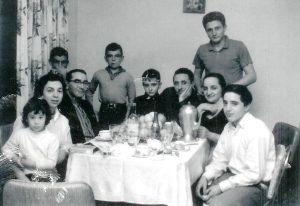
It was all about the thunder, not the lightning. Homer was easily spooked by any kind of loud noise. That included even the rather quotidian sound of a mail carrier or someone else knocking on our door to deliver a package. If the sound was just a few knocks at the door, Homer would get over his fright quite quickly–after he ran furiously toward the door, making his loudest German-shepherd-style vocalizations and hurling himself against the inside of the door so ferociously that he would lose his balance and wind up on the floor. As he picked himself up and regained his footing, he would not miss a single second of those deep, loud, and fast guttural barks. Honestly, for those 30 seconds to a minute, it sounded like he was planning to kill another dog—or somebody. But it would all be over as soon as the knocking ceased, he completed his ritual response, and one of us took hold of him. Never once did Homer’s seeming fury at the intruder translate into the slightest bit of antagonism toward the family member who restrained and calmed him.
I don’t remember if the first time Homer broke a hole in one of the lower screens and escaped was during a thunderstorm, or during some Fourth of July fireworks...
If his emotions were so triggered by a time-limited event, such as a man giving two or three knocks on our door, you might imagine how tormented he would feel about episodes in which he was continuously assaulted by loud noises. The two that come to mind are Fourth of July fireworks and thunderstorms.

Stock footage from Web but this is what Homer looked like as a puppy. He had one white paw and the rest brown. His ears would flop to the side like this but stand erect when he was alert.
We got him, my family’s first pet, as a little puppy when I was six or seven. Homer was half collie and half German shepherd. His coloring was darker brown than the former but lighter than the latter, with shorter hair like the latter. His ears stood straight up when he was attentive, like a shepherd. My brother Leon was nearly two years older and the two of us had the job of giving him a name. I don’t think we tried to find a name that corresponded to his looks or his personality. We were baseball fans and we wanted him to have a baseball name. And the first great nickname that came to us was Homer. Mom was the one who usually told people, “No, we didn’t name him after the Greek poet. Homer as in home run.” With or without a reason or an explanation, Homer was his name.
People say that German shepherds are really smart, and Homer was brilliant. (Maybe it derived also from his collie side, but I’ve never heard that said about collies.) I don’t think any of us kids—now in our 60s and 70s knows to this day how our Dad got him to do a bunch of tricks. I do remember that Dad got the idea for most of the tricks from his brother Ben, whom everyone called Bud. On one of our rare family trips to Jackson, Mississippi, where Uncle Bud lived, we were very impressed with the tricks he had taught his three Doberman Pinschers to play. These included the usual “sit,” but also “shake hands,” and “Play baby.” In response to the latter command, any of the dogs so commanded would roll onto their backs and stick their forepaws and hind legs up in the air.

Photo from 1957, the year we brought Homer into the family, seated at the home of our friends the Cortellinis. I guess I was scratching my nose (left, rear). Elaine is at left, Mom beside her, then Dad. Leon is on my left. Fernando Cortellini, with chin in hand, born in Italy, was the first violist of the Indianapolis Symphony Orchestra. Corrado, standing, would redesign Mom’s kitchen almost 50 years later.
In what seemed like no time after we got him, Dad had successfully taught Homer to perform all three of those tricks consistently. In an amusing twist, he could also get Homer to put forward his paw for a shake when he gave a command that he said was in Yiddish. The command was “sztekarein,” and dad said it meant, “put her there.” Homer would dutifully shake in response to it. But on the Web, I can only find “sztekarein” as a Hungarian word that has a completely different meaning. So I guess Dad and Homer had their own way of communicating. This latter theory was certainly proved by their most spectacular trick, one that always amazed everyone. I don’t remember if Uncle Bud’s dogs also did it, or if it had a different origin. It was called the “Mind Reading trick.”
Dad would tell Homer to sit. As Homer waited primly in the sitting position for the next command, Dad would let Homer see that he was putting something Homer liked to eat in his hand (anything from a dog biscuit to a small leftover piece of roast beef). Dad would then turn his back to Homer and whisper to whoever was there—family members, guests—either “he’s going to take it,” or “he’s not going to take it.” Dad would then offer what was in his hand to Homer. If Dad had said, “he’s going to take it,” Homer would take it gently from Dad’s hand, then chew and swallow it happily. If Dad had said, “he’s not going to take it,” Homer would turn his nose and closed mouth away as Dad proffered his hand with the food. Guests would open their eyes wide in awestruck wonder, but after a beat, they would sometimes claim that the dog must have heard Dad give the instruction: dogs do have amazing hearing, right? To counter them, Dad would say, “OK, if I hold up one finger, he’s going to take it. If I hold up two fingers, he won’t.” He would again turn his back to Homer and hold up either one or two fingers and Homer would still get it right! Now, explain that!
Some skeptics always assumed there was some kind of “tell,” that Dad was signaling to Homer by the way he held the food. But those of us in the family who were present to watch it hundreds of times had never observed anything like that that we could discern. It was the “mind reading trick” and we could never figure out anything other than that Homer really was a mind reader. He was that smart!
Smart, but so completely unnerved by loud noises.
We had a screened-in back porch that originally had floor-to-ceiling screens. It made a wonderful sleeping environment in the summer, since it got really hot in Indiana, but we had no air conditioning, like most people back then.
I don’t remember if the first time Homer broke a hole in one of the lower screens and escaped was during a thunderstorm, or during some Fourth of July fireworks a mile or two away. Both of them drove him crazy, and if you were nearby there was very little you could do to calm him. He broke out about three different times over the course of a year, so our parents decided to have metal shields installed over the bottom screens.
That’s when they found out he could jump up at least four feet and go through one of the upper screens.
Fortunately, Homer knew his way around our neighborhood. These were the days when we and other neighbors would just let their dogs out to run around—no need to go out with them, let alone to attach a leash. A few times a day, he would whimper quietly by the family room door, waiting for someone to open it. He would typically go out for anywhere from fifteen to 45 minutes, and then come back and be eager to drink from his water bowl in the kitchen. We never worried about him, and I never really pondered how far he may have roamed during his outdoor time. The times that he escaped happened when we had locked him in the screened porch while the family went somewhere. Homer must have been well served during those escapes by the geographic knowledge he had acquired in his daily meanderings. He would usually return within a few hours. Not that we would feel relaxed about that: any time we came home and discovered him missing, we would drive around in all directions and call his name for thirty minutes or an hour, before returning home, worried. But eventually, he would show up at home.
After one thunderstorm, a man who lived about a mile away called to say he had found Homer cowering and whimpering inside his garage. Our phone number was on Homer’s collar. We were happy to drive over and give him a ride home.
One Fourth of July, we were going to a barbecue at some friends’ home in a different part of town. We knew there would be an audible display of fireworks while we were gone, and we didn’t trust Homer to stay in the main part of the house without hurling himself around and probably breaking valuable things. But knowing that he could bust out of even the upper screens on the porch, we couldn’t leave him there either. My parents decided it was worth paying for a night at a kennel. It was a decent place with room to run around, where Homer had stayed when we were out of town a few times. We asked if there would be any fireworks nearby; they thought there would be nothing but a few kids or families setting off firecrackers or cherry bombs in the vicinity.
It’s probably fortunate that there were no cell phones back then, and of course the kennel didn’t know how to reach us when we weren’t answering our land line. So we were able to fully enjoy our planned Fourth of July barbecue with several other families, before coming home and getting the call. Homer had escaped from the kennel. The owners were very apologetic; they had not been aware that a drive-in movie theater, located about a mile from the kennel, was the site of a major fireworks display.
This time, they told my dad he had jumped over an eight-foot fence, something they claimed no other dog had ever done in all the years their family had been running the business. Well, we had given our dog a name that is literally baseball terminology for going “out of the park” or “over the wall.” He obviously took his name seriously.
We drove all around the streets within a mile or two of the the kennel, calling his name, to no avail. The next morning, they called us to report happily that Homer had come back. Where he spent the night was a complete mystery, but we were so relieved to bring him back home. I never asked my parents if they got their money back.
I don’t want to leave readers with the impression that Homer’s only qualities were his amazing smarts and his terror of loud sounds. He was a wonderful companion in so many ways. For reasons I don’t recall, I was once home alone as the other siblings and my parents had gone out during an evening. Except I wasn’t alone, because Homer was there, and I am sure I spent about 90 percent of the two to three hours they were all away petting him and sitting with him. And he never grew the slightest bit annoyed of it.
My brother Hugh was added to the family after Homer had been around for about four years. Homer must have been well aware of his distinctive baby smell (I’ve read that a typical dog can remember and differentiate 10,000 different scents). He also must have noticed what measures everyone in the family took to protect and care for him,. first as an infant and then as a toddler. I have a mental image of Hugh sitting in his stroller outdoors in our front yard, and Homer sitting about ten feet away on the grass, keeping guard. If someone came along walking on the street in front of our house, Homer would emit a low growl. He didn’t bark, but he was ready to bark–and attack—if anyone came too close to that stroller.
There was one thunderstorm when we all became frantic. We weren’t going anywhere; Homer had only broken out of the house if we left him alone, so seemingly, there was no worry about an escape. But we just couldn’t find him. He was well trained to stay in the wing of the house that included the family room, the kitchen, my sister Elaine’s bedroom, one bathroom, and the screened porch. I remember a time that Dad wanted to bring him to my parents’ bedroom to cheer up Mom, who was sick. He couldn’t get Homer to come into that part of the house, so he picked him up in his arms, all 40 to 45 pounds of him, and Homer squealed and squirmed and whimpered and cried all the way. That’s how disciplined and distressed he was to break a ground rule that had been drilled into him.
We kept checking the same places over and over. Surely he’s found a nook or cranny on the screened porch? Or he’s hiding in what we called the “fishy bathroom” (due to the wallpaper that covered it once-upon-a-time depicting colorful fish). No, and no. Is he in the closet in Elaine’s bedroom, or under the bed? Not there either. This was terrible. There were no broken screens. No open doors. This was terrible! Where could he be?
Our search stymied and our anxieties escalated, we really didn’t know what to think. Meanwhile, somebody went to check on 20-month old Hugh. He was in his crib in his own room next to my parents’ room, and sleeping happily, we hoped, through one of our classic booming midwestern thunderstorms.
Whoever went to check on Hugh came back with amazing news: Hugh was asleep, and Homer was found! Homer had deposited his long body into the crib! The dog’s terror had apparently driven him to violate his own sense of propriety by entering the “forbidden” part of the house. His spectacular intelligence had led him to understand that if there was one place in our house that must be the safest of all during an ear-splitting weather event, it would have to be the place where we stashed that little guy. Weren’t we always trying to protect him? Hadn’t Homer observed that every single day since Mom brought the baby home?
How did Homer know where the baby’s room was since he never even entered that part of the house? I don’t know; it’s like the mystery of the Mind Reading trick.
Homer not only figured out where to find the baby, but he had the skill to leap up and over the side of the crib (much easier than the eight-foot fence at the kennel, right?). And he knew he would have to do it on the first try, nearly noiselessly, to avoid awakening the sleeping toddler.
Homer was the best.
Dale Borman Fink retired in 2020 from Massachusetts College of Liberal Arts in North Adams, MA, where he taught courses related to research methods, early childhood education, special education, and children’s literature. Prior to that he was involved in childcare, after-school care, and support for the families of children with disabilities. Among his books are Making a Place for Kids with Disabilities (2000) Control the Climate, Not the Children: Discipline in School Age Care (1995), and a children’s book, Mr. Silver and Mrs. Gold (1980). In 2018, he edited a volume of his father's recollections, called SHOPKEEPER'S SON.




Amazing story of your ever-loyal, highly intelligent, terrified of loud sounds pet, Dale. The puppy picture is just the cutest ever! And the story of Homer jumping into Hugh’s crib defies description. Wish I could have seen that one! Thanks for sharing your amazing pet with us.
Unlike any other story I have written, I had this strong sense of having fulfilled an obligation when I had completed and published this one–an obligation to Homer, that is! It’s been a long time coming and deep in my consciousness, I felt he deserved this kind of tribute. Thanks for expressing your understanding and appreciation, Betsy.
Thanx Dale for the wonderful story and great photos of your lovable Homer.
Animals are really amazing aren’t they, and pretty smart!
Right now Dale, as I read this, my three best friends are sleeping peacefully no more than 5 feet away. Yoda is 17 years young, Luke is 7, and Finn is 2. Your beautiful tribute to Homer was so good, I actually read it aloud to them. Envisioning Homer wandering happily around was something I couldn’t imagine where I live. Having an enclosed back yard or visiting the local dog park is all the freedom they have, Homer was very lucky. As far as the tricks go, the mind-reading one was amazing. Your dad and Homer were really tight. But I’m sure, as in most dog relationships, he had a special connection to each one in the family. The thunder storms, the fireworks, even the innocent mailman, were parts of the story my little clan totally relates to. Wish we had silent fireworks because it really is tough on them. I agree with you, Homer deserved this honor.
Patty, it would be hard to imagine a way to appreciate my story or to pay homage to Homer any more effectively and inspirationally than you have just done it! By sharing the narrative with Yoda, Luke, and Finn, you have truly written the next chapter of the story.
For that and for your appreciation of each of the wrinkles in the story, from the fireworks to the thunderstorms to the bond and communication that apparently existed between Homer and my dad–THANK YOU!
I love this story, Dale. Homer reminds me of one of my 7 grand-dogs, Lucy. She came to my daughter’s family during the pandemic, a rescue mutt (is it OK to say that these days) with a traumatic past. Apparently, Lucy’s owner in Kentucky died and she was shipped to Illinois, a long journey by truck. My daughter met her at her foster home and decided she was the one to replaced their beloved dog, Penny. Lucy loved my daughter and one of my granddaughters, but that was it. Men were not to be trusted and she charged the door. Luckily, all she did was bark. Except during thunder storms and on the 4th of July when she trembled on my daughter’s lap or tried to find a place to hide. One 4th of July after the family let her out, like Homer, she actually escaped the backyard. We could never figure out how she did it, but they found her cowering on the front porch the next morning.
Looks like there were a number of parallels there between Lucy and Homer. I have not written the story of how my parents finally decided it was time to remove Homer from our home and neighborhood (when delivery men started showing up with hammers and threatening to use them). He had still never hurt anyone, just frightened them mercilessly. They donated him to a farm that was out in a rural area. (They had a high fence but all of us who are paying attention know that was irrelevant.) Anyway, maybe Homer had progeny from that vantage point. Maybe Lucy is one of his progeny. It would be nice to imagine.
We are partial to greyhounds, which are either dumb as paint or utterly disdainful or any behavior that doesn’t result in food or a ball/toy toss. But Homer was a handsome boy.
Trane, our current doofus, is 95 lbs; his shoulders almost reaches my hips. We found out how afraid he is of fireworks on the first 7/4 that we had him, when a big one went off about a block away and he bolted. You ALWAYS keep a grey on a leash which is around your wrist, because running is their first reaction to anything. He yanked me off my feet like I was weightless and dragged me on my chest and stomach through a pile of gravel that had been left by a sidewalk repair crew. A regular Nantucket sleigh ride, only gravel is sharper than water.
Years later and he is still the same. One firecracker blocks away and he slinks off to hide in terror, making a strange growl/whine that he ONLY makes in response to fireworks and thunder.
All (most?) pets go to ‘heaven’ and they get a ‘Plus One’ meaning they vouch for you (for us).
Sorry I missed this the first time around. What a wonderful tribute to a remarkable dog and companion! I could tell this was indeed a labor of love, recalling so much, such rich memories. You and Homer hit it out of the park.